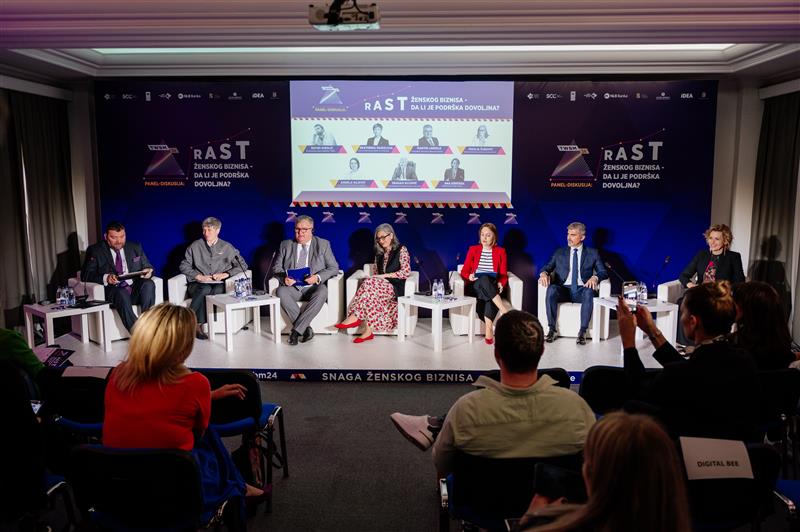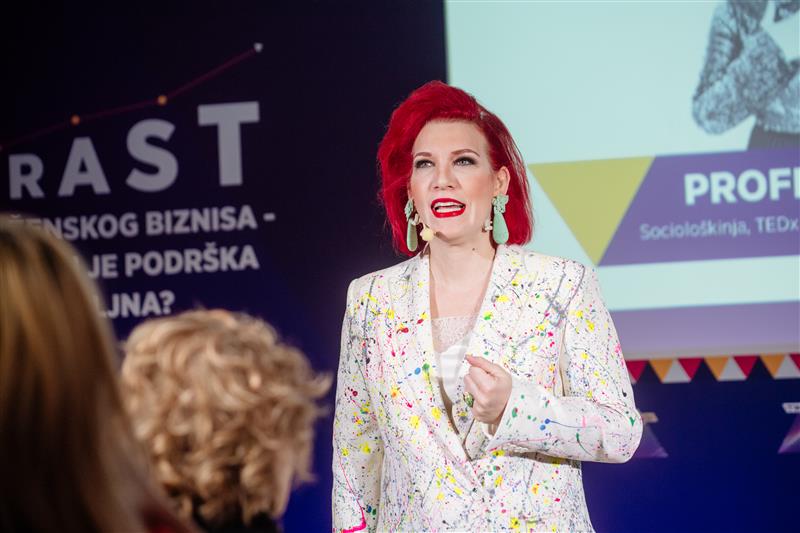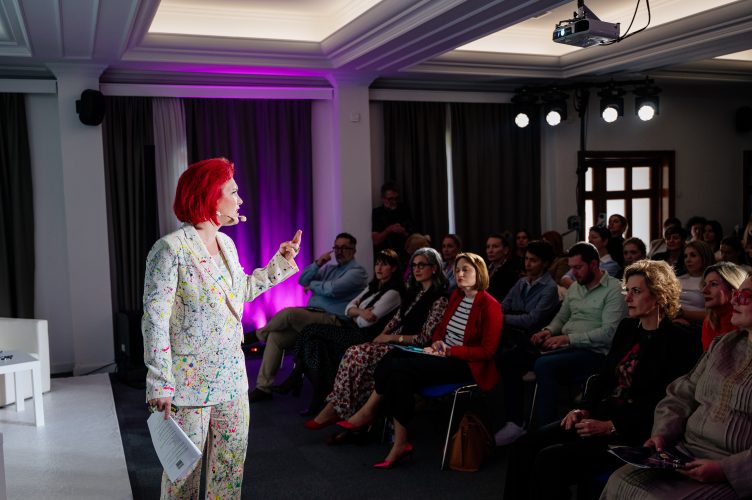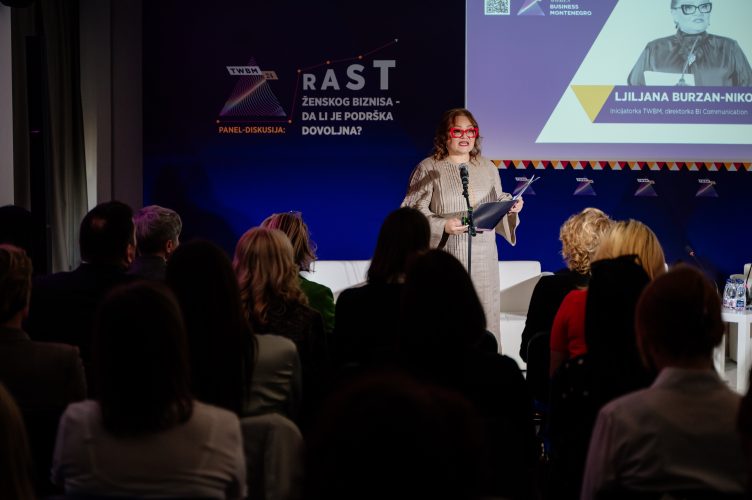Increased share of Women-owned businesses in the domestic economy
Last year, the number of women-owned businesses grew faster than the total number of businesses in the domestic economy, also increasing their contribution to overall results based on business income. This was highlighted at the panel discussion "Growth of women's businesses - is support sufficient?" organized under the Top Women Business Montenegro 2024 (TWBM) initiative. The panel also concluded that the increase in the number of companies owned by women confirms that support systems for women enterpreneurs in Montenegro are yielding concrete results.

Podgorica, October 29, 2024 – Last year, the number of women-owned businesses grew faster than the total number of businesses in the domestic economy, also increasing their contribution to overall results based on business income. This was highlighted at the panel discussion “Growth of Women’s Businesses – Is Support Sufficient?” organized under the Top Women Business Montenegro 2024 (TWBM) initiative. The panel also concluded that the increase in the number of companies owned by women confirms that support systems for women entrepreneurs in Montenegro are yielding concrete results.
 Ratko Nikolić, Executive Director of BI Consulting and Chief Analyst of the TWBM initiative, said that the number of women-owned businesses continues to rise, and last year this growth rate exceeded that of overall business growth, leading to an increase in the share of women-owned businesses in the domestic economy.
Ratko Nikolić, Executive Director of BI Consulting and Chief Analyst of the TWBM initiative, said that the number of women-owned businesses continues to rise, and last year this growth rate exceeded that of overall business growth, leading to an increase in the share of women-owned businesses in the domestic economy.
“In addition to their numbers, their contribution to overall results—specifically in terms of business revenue and employment—is also on the rise. Women-owned companies are still most prevalent in the service sector. Geographically, the growth in the number of these companies is significantly higher in the southern region compared to the central and northern regions. The results of our analysis provide grounds to believe that we may be witnessing the start of a long-term positive trend, though whether this will continue will largely depend on the systemic support provided to women in business,” said Nikolić.
 Ekaterina Paniklova, the Permanent Representative of the United Nations Development Program (UNDP) in Montenegro, noted that while women make up more than half of the population of Montenegro, they remain underrepresented in leadership and management positions, “owning only 15% of companies and occupying only 7% of director positions, which is especially noticeable in the northern region.”
Ekaterina Paniklova, the Permanent Representative of the United Nations Development Program (UNDP) in Montenegro, noted that while women make up more than half of the population of Montenegro, they remain underrepresented in leadership and management positions, “owning only 15% of companies and occupying only 7% of director positions, which is especially noticeable in the northern region.”
“These figures underscore the need for systemic change and additional resources to create equal opportunities for women across all regions. UNDP and its partners are dedicated to the economic empowerment of women through training in management, innovation, and digital literacy, enabling women, especially in rural areas, to develop businesses in fields such as agriculture, rural tourism, and green industries, thereby supporting sustainable community development. Our regional program for women’s economic empowerment focuses on enhancing women’s skills for next-generation jobs, which are crucial to the rapidly evolving labor market and will enable women to contribute significantly to Montenegro’s economic development,” said Panikova.
 Martin Leberle, President of the Board of Directors of NLB Bank, said that the geographical characteristics of the northern and southern regions have strongly influenced the development of habits among citizens.
Martin Leberle, President of the Board of Directors of NLB Bank, said that the geographical characteristics of the northern and southern regions have strongly influenced the development of habits among citizens.
“The way they planned and organized themselves subsequently influenced the growth of entrepreneurship. Women in Montenegro, overcoming inherited societal norms, have demonstrated vision and courage in turning their potential into successful businesses. Women are better prepared, more responsible, plan effectively, fulfill their obligations consistently, and are agile and approachable. I am proud that such women make up more than half of the workforce at NLB Bank, which has been supporting and promoting female entrepreneurship for years,” said Leberle.
 Marija Šuković, Head of the Secretariat of the Competitiveness Council, expressed her satisfaction that the SCC is once again part of the TWBM initiative.
Marija Šuković, Head of the Secretariat of the Competitiveness Council, expressed her satisfaction that the SCC is once again part of the TWBM initiative.
“The quality of analysis, achieved through a methodologically consistent approach to monitoring trends in female entrepreneurship, is especially important. We are pleased to see the increase in women-owned companies, but further analysis is needed to understand whether this growth is the result of sustained efforts in women’s economic empowerment or other factors without long-term positive impacts,” said Šuković.
She also highlighted the numerous activities undertaken by the SCC in the field of women’s economic empowerment, with special emphasis on the “Women’s Business” (ŽIG) project, which aims to accurately identify women-owned businesses and facilitate access to financial and non-financial support.
 Anđela Gajević, Acting Director General of the Directorate for Improving Economic Competitiveness, noted that the Government of Montenegro and the Ministry of Economic Development are consistently creating and implementing strategic policies in the field of female entrepreneurship, and that they are making additional efforts to strengthen female entrepreneurship, thereby providing this important societal segment with greater opportunities to contribute to the country’s socio-economic progress.
Anđela Gajević, Acting Director General of the Directorate for Improving Economic Competitiveness, noted that the Government of Montenegro and the Ministry of Economic Development are consistently creating and implementing strategic policies in the field of female entrepreneurship, and that they are making additional efforts to strengthen female entrepreneurship, thereby providing this important societal segment with greater opportunities to contribute to the country’s socio-economic progress.
“Thanks to the efforts of the Government and the dedication of the Ministry of Economic Development, Montenegro has been recognized by the Organization for Economic Cooperation and Development (OECD) as a leader in the Western Balkans in planning and implementing policies to empower female entrepreneurship,” Gajević emphasized.
 Dragan Kujović, Vice President of the Chamber of Commerce of Montenegro, affirmed that the growth in the number of women-owned companies demonstrates that support systems for women entrepreneurs in Montenegro are achieving concrete results, enhancing their participation in entrepreneurial activities.
Dragan Kujović, Vice President of the Chamber of Commerce of Montenegro, affirmed that the growth in the number of women-owned companies demonstrates that support systems for women entrepreneurs in Montenegro are achieving concrete results, enhancing their participation in entrepreneurial activities.
“It is also evident that women are ready to take the initiative, actively using opportunities for professional development and skill enhancement, thereby strengthening the impact of women’s entrepreneurship on Montenegro’s economic growth,” he noted.
 Ana Kentera, Executive Director of MFI Alter Modus, stated that Alter Modus focuses on projects and programs aimed at promoting women’s entrepreneurship and increasing the number of women-owned businesses by improving access to financing.
Ana Kentera, Executive Director of MFI Alter Modus, stated that Alter Modus focuses on projects and programs aimed at promoting women’s entrepreneurship and increasing the number of women-owned businesses by improving access to financing.
“At the beginning of September, Alter Modus signed a new loan agreement with the EBRD for €10 million, of which €4 million is allocated for the Women in Business program. We are aware that collaborative efforts with institutions specialized in sensitive market segments can drive significant change and ensure adequate financial and non-financial support for businesses led by women,” said Kentera.
 The panel discussion was preceded by an inspiring lecture, “Imposter Syndrome: Is It Only Her Problem?” by Dr. Maja Jovanović, a sociologist, TEDx speaker, and author.
The panel discussion was preceded by an inspiring lecture, “Imposter Syndrome: Is It Only Her Problem?” by Dr. Maja Jovanović, a sociologist, TEDx speaker, and author.



